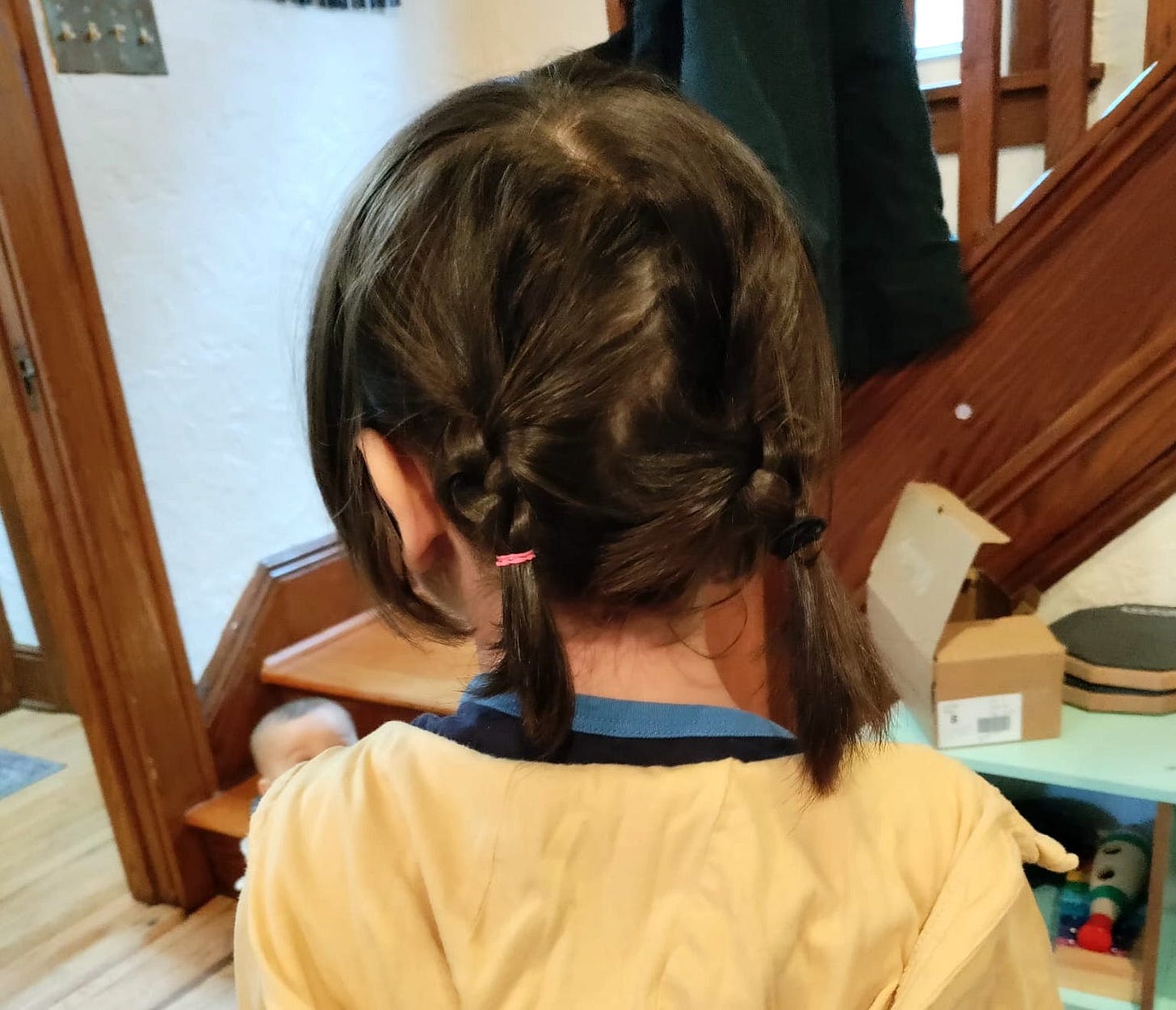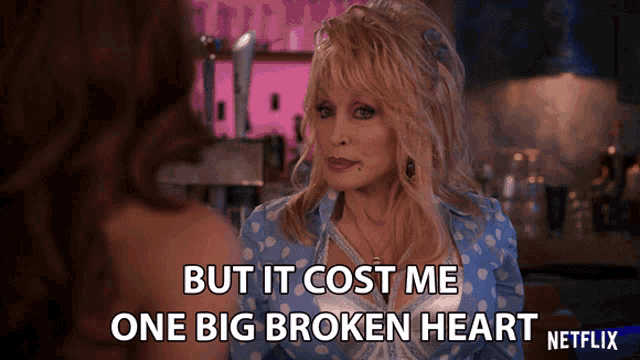This Week: And I Will Always Love You
On constant, unconditional love for our kids — and ourselves.
This Substack is here to publicly explore a hypothesis with you all. The idea behind everything I write here is that life is inherently chaotic and by accepting the messiness of the world we can unlock new realms of creativity and innovation and relinquish the ego-driven violence that plagues humanity. If you’d like to join that journey, please consider becoming a paid subscriber to support my work. You’ll get Q&As with creatives in your inbox, along with reported essays about various ways in which chaos shows up in the world. If not, that’s cool, too! Do what’s good for you. We love to see it.
Dear fam,
The last couple of months have been wild. You know, moving to a new house with two little kids isn’t easy. Acclimating to a new space , making new friends, working our regular jobs and preparing for High Holiday services, helping our kiddos with transitions big and small — it’s all been pretty nonstop. Frankly, I see no stopping or slowing down any time soon.
Parenting is, famously, not a job with any PTO benefits. Instead of taking a nice day off to regroup and figure where up and down are, we get to scurry around until we pass out and then do it all again the next day. And the next. We’re constantly debriefing events whilst in the middle of the next event. There’s a lot of guesswork. All the training is on the job.
It’s hard to know if you’re getting things right or not. Or even what the heck right is. Which is why I’m grateful for the opportunity to write this newsletter, where I ruminate on it all every week for an hour, and to read the writing of other parents who wonder in words like I do.
This week, I’m trying to understand a curious new behavior Big Kid is exhibiting. It always happens when I or my wife get upset with him for something (say, scaling a bookcase or running away when we need to get out the door) and take a stern tone with him. Almost immediately, he asks for a hug. Sometimes he’ll add, “We still love each other,” or, “You’re still my bestie.” We assure him that, yes, of course we always love him. It’s just the behavior that we’re upset about; he is always our beloved kid.
It’s not curious to me why he’s doing this. When someone you love very much is upset with you, it’s very natural to want reassurance that everything is cool. It’s kind of like he’s asking, “Hey, we’re cool, right?” but in a four-year-old vernacular.
What is striking (and concerning) is that this speaks to a certain level of uncertainty I wish he didn’t have. It’s also a little too reminiscent of myself and my own insecurities.
I want Big Kid and Baby to know they’re loved in their bones. Of all the doubts they may encounter over the years, I don’t want this to be one of them. It concerns me a little that he’s asking this so often.
Sometimes (especially at night, when my worries won’t shut up), I wonder whether he’s picking up on my own insecurity. Is he learning this behavior from me? I try not to show my weird anxieties to my children, but they’re smart. They pick up on energy and vibes. And lately I have had a lot of moments in which I felt less than great.
Fear of disapproval is a huge one for me. Almost as bad as my fear of heights, and that one led me to attempt a zip-line into a river while drunk one time in my early 20s. PSA: don’t do that. I lost my shoes and almost got swept down the river to who-knows-where.
But I digress.
My second biggest fear is not being loved or accepted, and I very much believe this is a common experience for lifelong ADHD-ers who were diagnosed in adulthood. As a kid and a teen, there were certain things I could not do (arriving on time, for example, or getting organized enough to do my homework on time) and they all seemed easy for everyone else. Each eye-roll or glare or disappointed sigh joined the others, until the experiences of failure piled up into a crushing mountain of discontent.
I am still, in adulthood, learning to love myself unconditionally. And I’m not super good at it yet. It helps that I’m learning about ADHD now. I understand that time blindness is a real thing, and so are dyscalculia, sensory overload, short-term memory problems, and emotional dysregulation. I understand the systems I was a part of were not built to encourage my success and I didn’t have the skills to mitigate my problem.
Still, when I let down a friend because I forgot to call when I promised I would, I feel like shit. When I miss a critical email and lose out on a project, I curse myself under my breath. When I write an article that pisses off a lot of people (which just happened last week), I wonder if the commenters may be right, and I am terrible.
“We still love each other, right?” I want to ask everyone I’ve disappointed, “We’re still besties?”
I never want my kids to feel this way. Heck, I don’t want anyone to feel this way! It’s awful.
My plan, thus far, has been to love them unconditionally, tell them so all the time, and work on fixing my psyche so they don’t catch on to my insecurities. Also, to teach them the skills to handle any possible situation so they don’t experience failure.
As I write these words, I’m realizing this may not be the most realistic solution. See? We’re working things out together already!
See, I know failure feels awful. But I also know it’s a crucial part of learning how to be a person who interacts with the world. When I flunked 9th grade English with a spectacular 0 on my report card, I cried all the way home. But the sun rose the next day — and I never flunked English again. In fact, I ended up doing so well I was able to test out of 12th grade English and sleep in one day a week.
And, of course, I am now a language person for a living.
It’s harder to feel okay about messing up when the misstep is relational. Letting people down, whether friends or strangers on the internet, hurts my heart. But it’s also inevitable. I let down the people I love, but hopefully they love me enough to work things out and give me the chance to try again. I hope my kids meet a lot of friends like that, who have compassion and see them as the evolving, flawed, people they are.
Maybe that’s the key takeaway. The thing to aspire to. Maybe the point isn’t to try and keep my sweet darlings away from heartache and feelings of profound failure, but to guide them towards those who will support them as they pick up the pieces. To let them know we will be there to help pick up the pieces.
What if we all knew we are destined to stumble or fall flat on our faces? And that it’s not the end of the world when that happens? Would that allow us to love ourselves without condition? What if we didn’t have to prove our worth to be deserving of love?
I’d like to imagine a world like that.
May this Shabbat be one of internal peace and sweet sunshine.
Shabbat shalom,
Mikhal
What I’m reading
This essay about finding pleasure and contemplation in the festival of Sukkot, written by my cousin
who just launched a Substack called and has always been one of the wisest people I know. You should all go read his work! It’s wonderful.This essay about letting go of the things that weigh you down, metaphorically and truly, by
in . Happy birthday Sari! This essay was wonderful and Oldster is one of my favorite publications on this platform.This completely wild and a little unhinged, but completely delectable, essay about finding oneself in the words of the prayer service on Yom Kippur by
in . I love Talia’s writing so much, not least because it is so potent and draws the reader into a world of imagery that makes you forget to breathe. In a good way.This very lovely Q&A with Stephanie Forshee in
’s .
What I’m listening to
What I’m writing
This essay about a TikTok parenting trend that really brought out the hate comments — including one strange one about how I’m obviously a Jewish writer? Which I am. But seeing that someone was noting it in a hateful context freaked me out more than a little.
This article about the Stav Festival, a monthlong celebration of Israeli artists and art at the 14th Street Y curated by the Israeli Artists Project (IAP).








Thanks for the article. Reminds me of the struggles when my kids were younger. I was tired all the time. And always doubting whether I did the right thing. And was sure i did the “wrong” terrible thing in more than one occasion. Thankfully they turn out okay, as far as I can tell. Phew. And you know what. You have nothing to prove. You already belong. All of us. I find this incredibly comforting.
Thanks for sharing Stephanie's interview! So relatable and lovely. And gosh I relate to so much of this. Some days I wish there was a switchboard where I could make sure the right messages get to the right part of our son's memory and the dials are turned to the right level of caution/playful etc. But alas that doesn't exist!